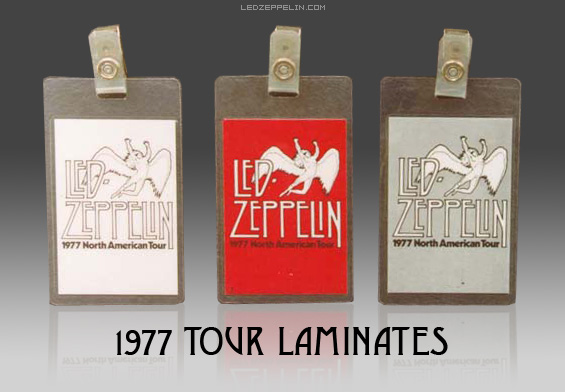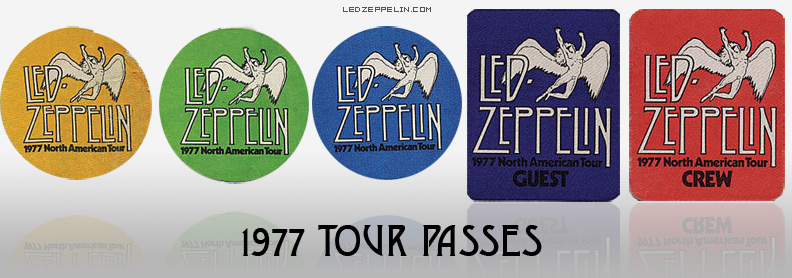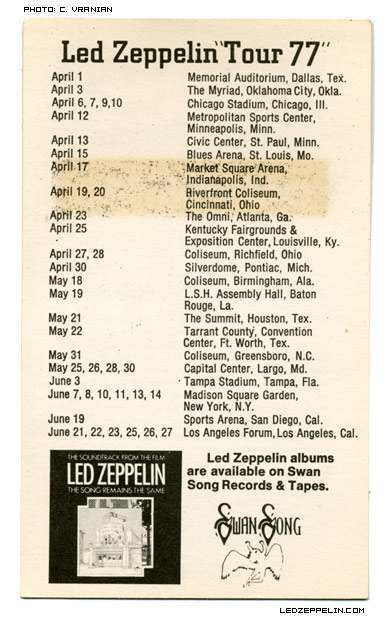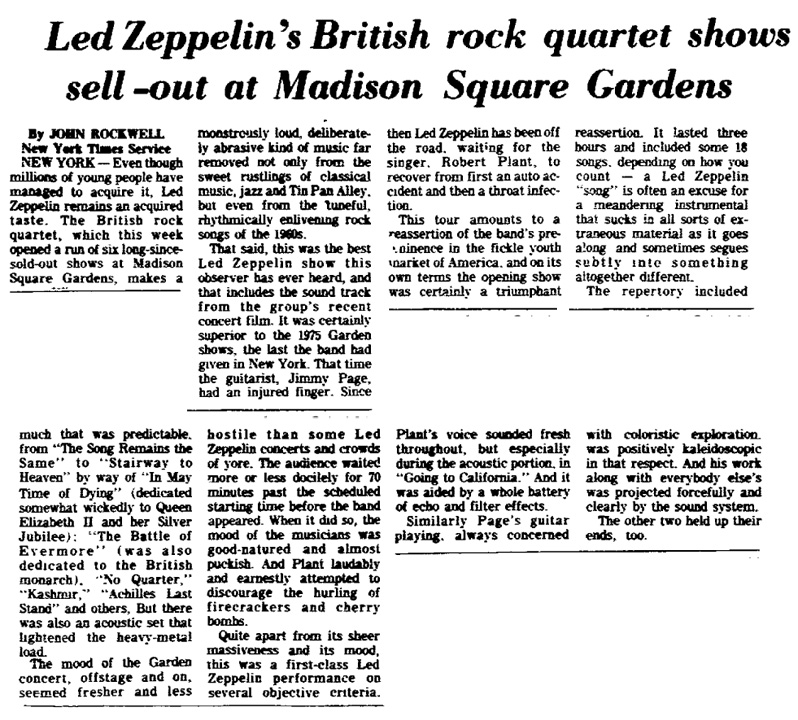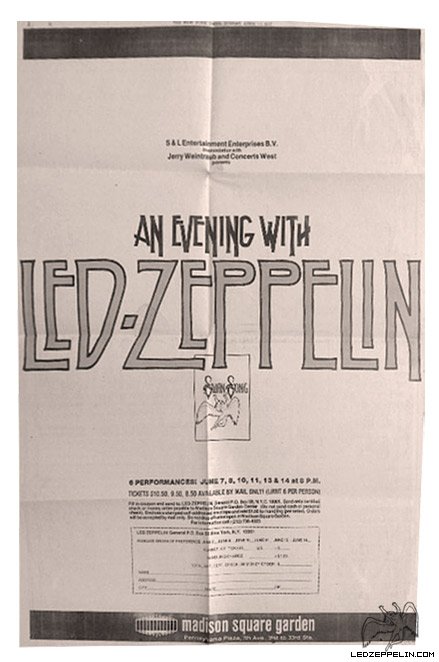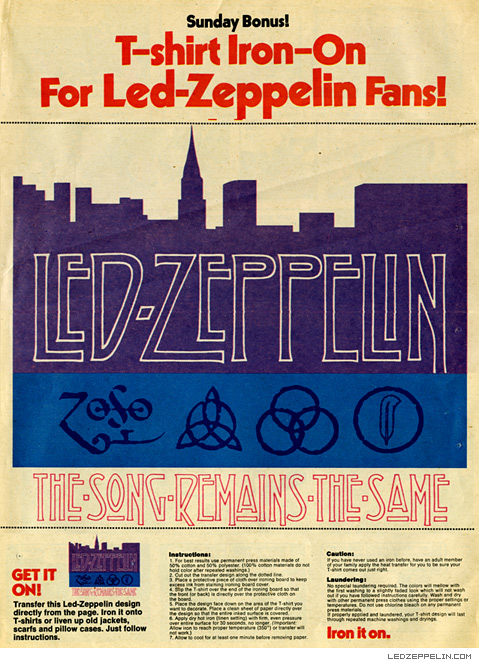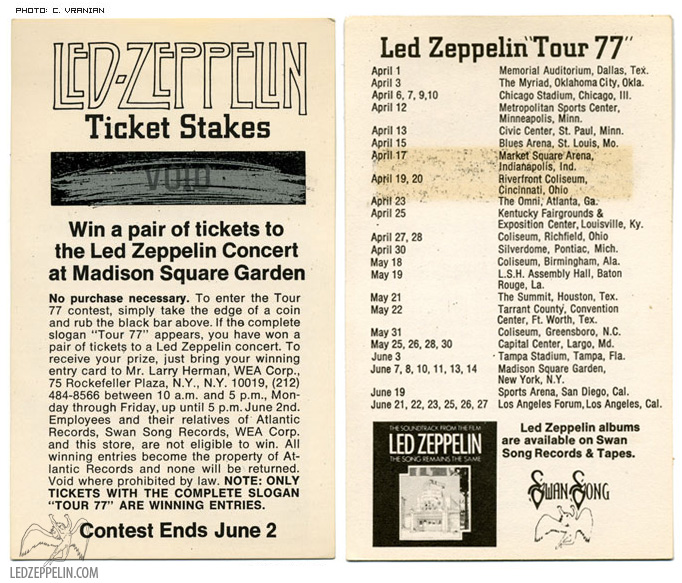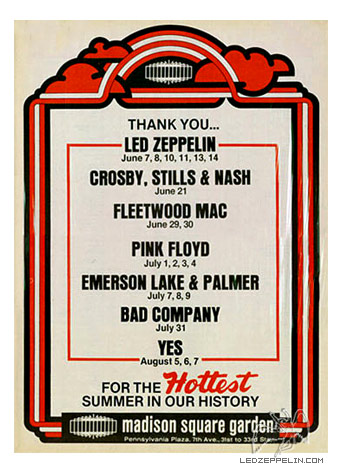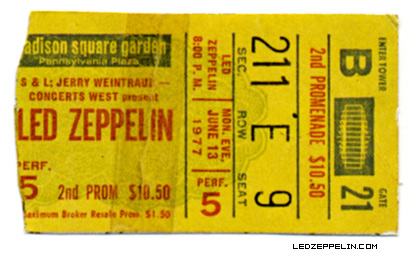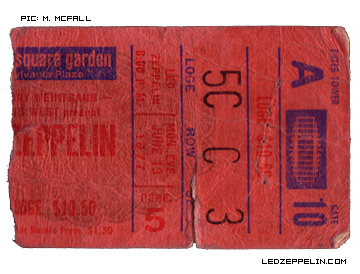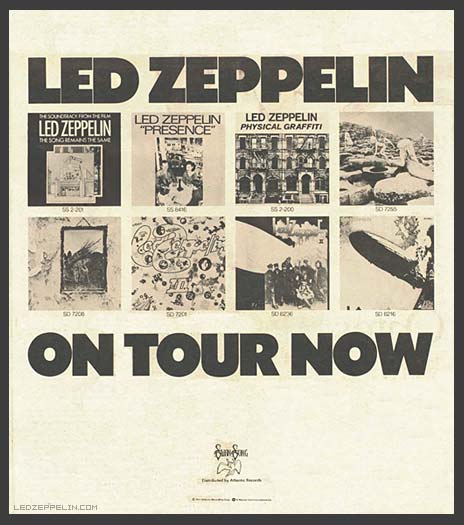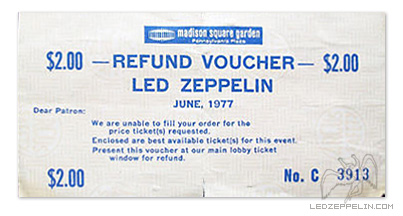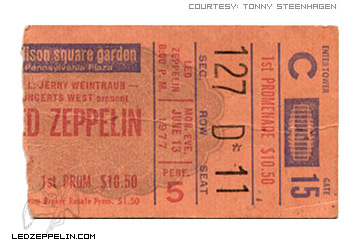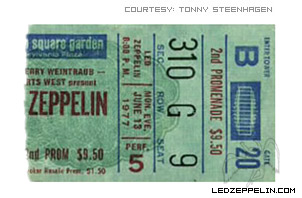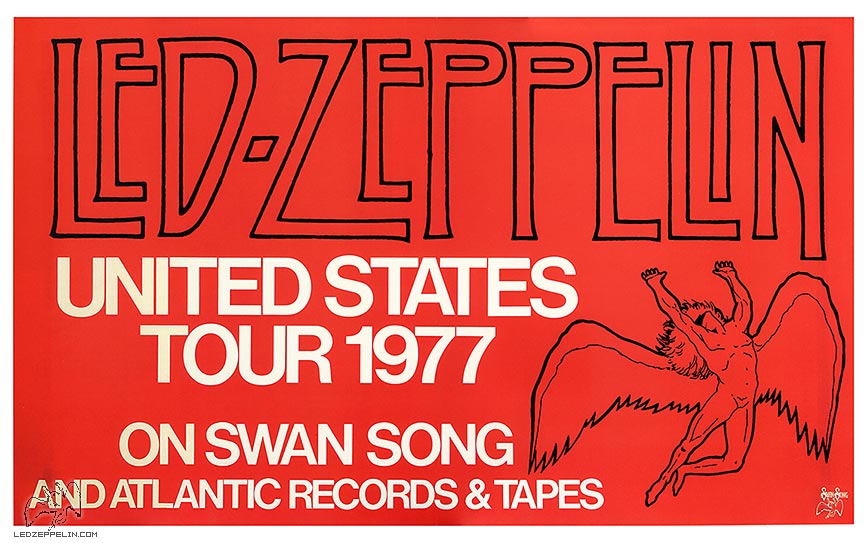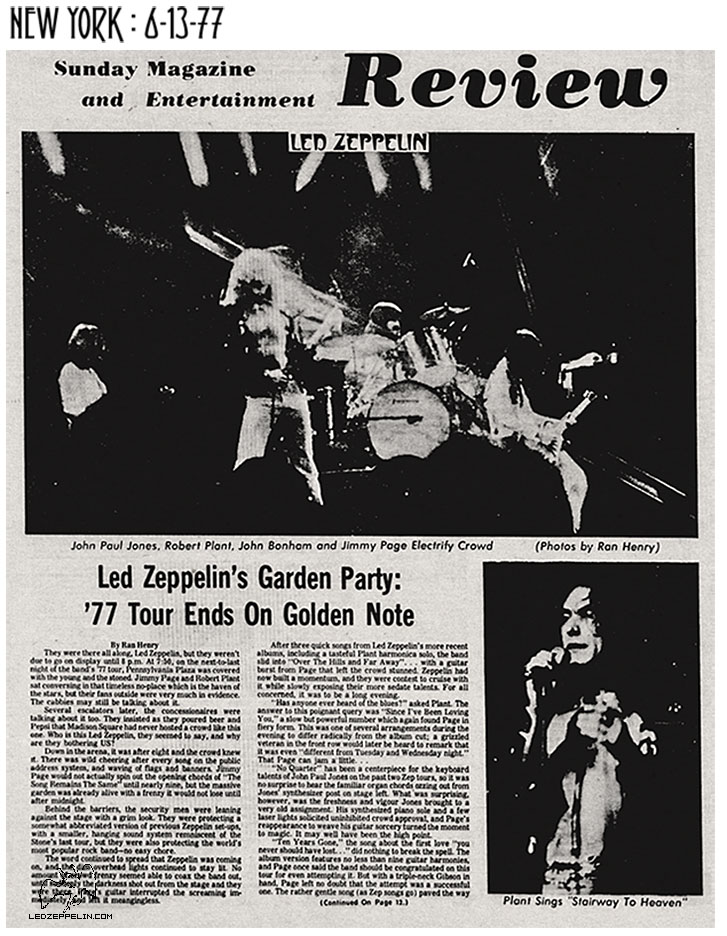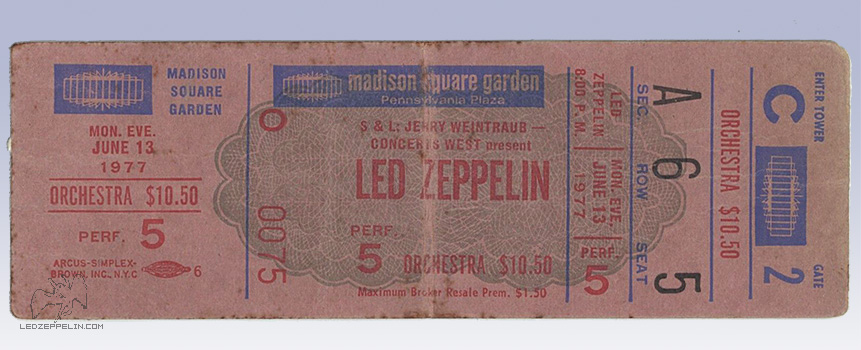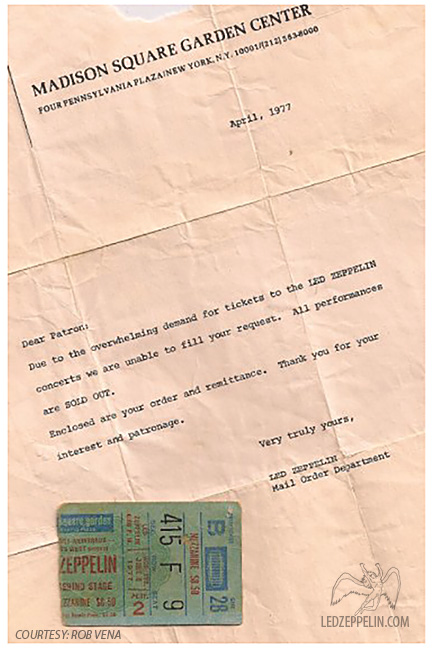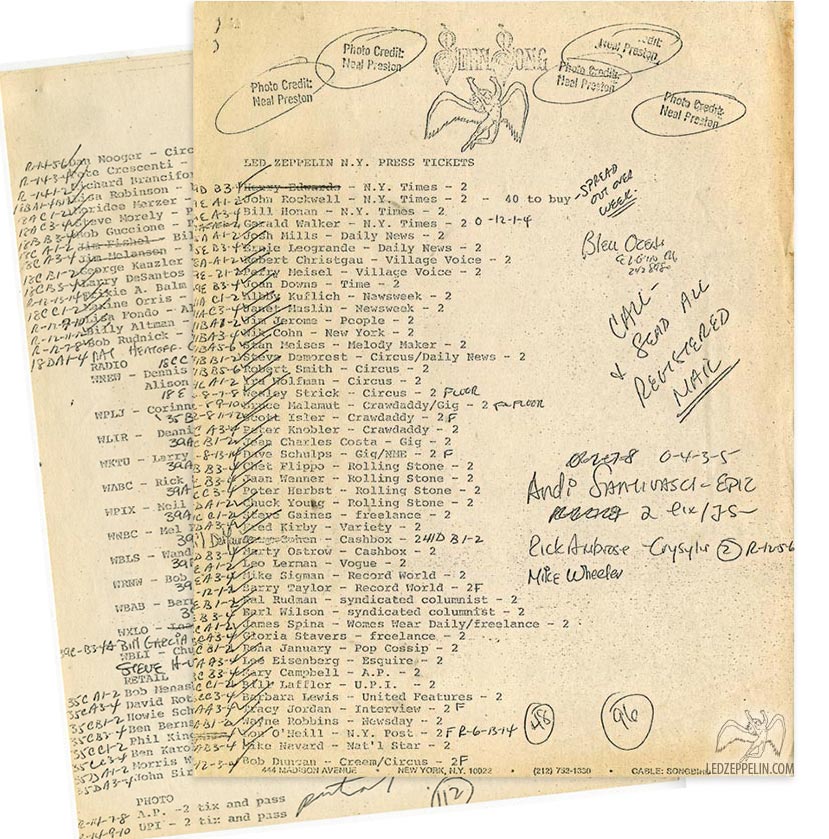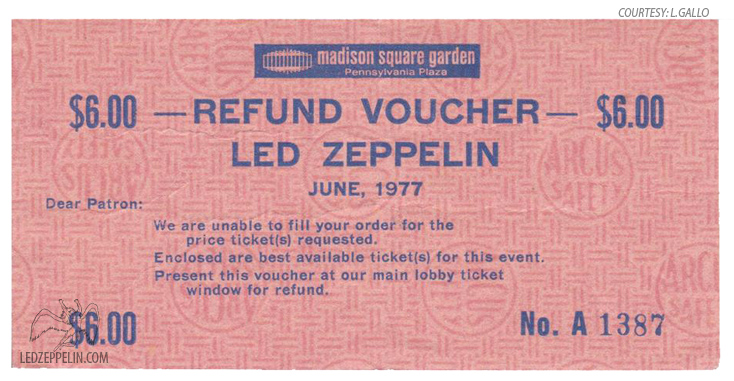The Song Remains The Same, (The Rover intro) Sick Again, Nobody's Fault But Mine, Over the Hills and Far Away, Since I've Been Loving You, No Quarter, Ten Years Gone, Battle of Evermore, Going to California, Black Country Woman, Bron-Y-Aur Stomp, White Summer ~ Black Mountainside, Kashmir, (Out On the Tiles intro) Moby Dick, Heartbreaker, Jimmy Page solo, Achilles Last Stand, Stairway to Heaven, Whole Lotta Love ~ Black Dog.
 |
Click here to view the US '77 Tour Programme (flipbook) |
Press Review: Led Zeppelin’s Garden Party
They were all along. Led Zeppelin, but they weren’t due to go on display until 8 pm. At 7:50, on the next – to –last night of the band’s ’77 tour (1st leg), Pennsylvania Plaza was covered with the young and the stoned. Jimmy Page and Robert Plant sat conversing in that timeless no-place which is the haven of the stars, but their fans outside were very much in evidence. The cabbies may still be talking about it.
Several escalators later, the concessionaires were taking about it too. They insisted as they poured beer and Pepsi that Madison Square Garden had never hosted a crowd like this one. Who is this Led Zeppelin, they seemed to say, and why are they bothering us?
Down in the arena, it was after eight and the crowd knew it. There was wild cheering after every song on the public address system and waving of flags and banners. Jimmy Page would not actually spin out the opening chords of the Song Remains the Same until nearly nine, but the massive garden was already alive with a frenzy it would not lose until after midnight.
Behind the barriers, the security men were leaning against the stage with a grim look. They were protecting a somewhat abbreviated version of previous Zeppelin setups, with a smaller, hanging sound system reminiscent of the Stone’s last tour, but they were also protecting the world’s most popular rock band – no easy chore.
The word continued to spread that Zeppelin was coming on and the dim overhead lights continued to stay lit. No amount of crowd frenzy seemed able to coax the band out, until suddenly the darkness shot out from the stage and they were there. Page’s guitar interrupted the screaming immediately and left it meaningless.
After three quick songs from Led Zeppelin’s more recent albums, including a tasteful Plant harmonica solo, the band slid into Over the Hills and Far Away… with a guitar burst from Page that left the crowd stunned. Zeppelin had now built a momentum and they were content to cruise with it while slowly exposing their more sedate talents. For all concerned, it was to be a long evening.
“Has anyone ever heard of the blues?”, asked Plant. The answer to this poignant query was Since I’ve Been Loving You, a slow but powerful number which again found Page in fiery form. This was one of several arrangements during the evening to differ radically from the album cut; a grizzled veteran in the front row would later be heard to remark that it was even “different from Tuesday and Wednesday night.” That Page can jam a little…
No Quarter has been a centerpiece for the keyboard talents of John Paul Jones on the past two Zep tours, so it was no surprise to hear the familiar organ chords oozing out from Jones’ synthesizer post on stage left. What was surprising, however, was the freshness and vigor Jones brought to a very old assignment. His synthesized piano solo and a few laser lights solicited inhibited crowd approval and Page’s reappearance to weave his guitar sorcery turned the moment to magic. It may well have been the high point.
Ten Years Gone, the song about the first love “you never should have lost…” did nothing to break the spell. The album version features no less than nine guitar harmonies, and Page once said the band should be congratulated on this tour for even attempting it. But with a triple-neck guitar in hand, there was no doubt that the attempt was a successful one. The rather gentle song (as Zep songs go) paved the way for a novel but effective acoustic set.
Coming almost exactly halfway through the performance, the acoustic set was Zeppelin’s surprising non-surprise. It was surprising because, aren’t these guys the terrible overlords of heavy metal? And yet not surprising because we had all been clued in to this unexpected turn of events. Such mellow classics as Battle of Evermore and Going to California found Page on a stool with a mandolin, while the rest of the band and various guitars lurked nearby. For Led Zeppelin, it opened gates that are apt in the future to release anything.
Kashmir brought the crowd back to rock reality, as the thunderous Zeppelin epic reverberated through the Garden. But it also introduced a John Bonham drum solo, geared with its smoke and moving drum stage to the young and easily impressionable. It is Led Zeppelin’s irrevocable policy to give each of the musicians their solo moment in the spotlight; Bonham’s moment however, may have gone one too long this night. The man’s talent is best displayed when he is riding herd over the whole Zeppelin sound, thunderously propelling Jones’ bass lines.
After an un-introduced, extended guitar solo by Jimmy Page… there was still time for Achilles Last Stand and Heartbreaker before the show melted into the only possible climax.
And for the umpteenth time, Stairway to Heaven knocked ‘em cold. Their ‘song of hope’ is a song that no Zep audience could leave without hearing, for everyone needs the kind of wishful wondering that Stairway has to offer. The crowd was spellbound and did not seem to notice, or care that Plant forgot several verses. The song was there, and that was more than enough. If Page unwittingly created a monster when he contrived those first compelling chords, he is keeping quiet about it. In New York, Stairway to Heaven spoke for itself.
There was an encore, of course, but the knowledge of the hated lights and the dreaded aftermath of dispelling tension gnawed at the back of the amps. It was not Zeppelin’s fault they threw everything they could into a rousing medley of Whole Lotta Love and Black Dog, everyone had to rest.
So when they grabbed their towels and took their bows, before turning an army of twenty-two thousand out into the streets, it was easy to see that it had been a long night, a long tour, and not very long at all since they had rock and rolled.
But the mystique will live on. They may still talk about it down on Fourteenth Street. [Sunday Magazine, 6/77]
----------------
 |
Click here to view the US '77 Tour Programme (flipbook) |
Press Review (I): Led Zeppelin’s Garden Party
They were all along. Led Zeppelin, but they weren’t due to go on display until 8 pm. At 7:50, on the next – to –last night of the band’s ’77 tour (1st leg), Pennsylvania Plaza was covered with the young and the stoned. Jimmy Page and Robert Plant sat conversing in that timeless no-place which is the haven of the stars, but their fans outside were very much in evidence. The cabbies may still be talking about it.
Several escalators later, the concessionaires were taking about it too. They insisted as they poured beer and Pepsi that Madison Square Garden had never hosted a crowd like this one. Who is this Led Zeppelin, they seemed to say, and why are they bothering us?
Down in the arena, it was after eight and the crowd knew it. There was wild cheering after every song on the public address system and waving of flags and banners. Jimmy Page would not actually spin out the opening chords of the Song Remains the Same until nearly nine, but the massive garden was already alive with a frenzy it would not lose until after midnight.
Behind the barriers, the security men were leaning against the stage with a grim look. They were protecting a somewhat abbreviated version of previous Zeppelin setups, with a smaller, hanging sound system reminiscent of the Stone’s last tour, but they were also protecting the world’s most popular rock band – no easy chore.
The word continued to spread that Zeppelin was coming on and the dim overhead lights continued to stay lit. No amount of crowd frenzy seemed able to coax the band out, until suddenly the darkness shot out from the stage and they were there. Page’s guitar interrupted the screaming immediately and left it meaningless.
After three quick songs from Led Zeppelin’s more recent albums, including a tasteful Plant harmonica solo, the band slid into Over the Hills and Far Away… with a guitar burst from Page that left the crowd stunned. Zeppelin had now built a momentum and they were content to cruise with it while slowly exposing their more sedate talents. For all concerned, it was to be a long evening.
“Has anyone ever heard of the blues?”, asked Plant. The answer to this poignant query was Since I’ve Been Loving You, a slow but powerful number which again found Page in fiery form. This was one of several arrangements during the evening to differ radically from the album cut; a grizzled veteran in the front row would later be heard to remark that it was even “different from Tuesday and Wednesday night.” That Page can jam a little…
No Quarter has been a centerpiece for the keyboard talents of John Paul Jones on the past two Zep tours, so it was no surprise to hear the familiar organ chords oozing out from Jones’ synthesizer post on stage left. What was surprising, however, was the freshness and vigor Jones brought to a very old assignment. His synthesized piano solo and a few laser lights solicited inhibited crowd approval and Page’s reappearance to weave his guitar sorcery turned the moment to magic. It may well have been the high point.
Ten Years Gone, the song about the first love “you never should have lost…” did nothing to break the spell. The album version features no less than nine guitar harmonies, and Page once said the band should be congratulated on this tour for even attempting it. But with a triple-neck guitar in hand, there was no doubt that the attempt was a successful one. The rather gentle song (as Zep songs go) paved the way for a novel but effective acoustic set.
Coming almost exactly halfway through the performance, the acoustic set was Zeppelin’s surprising non-surprise. It was surprising because, aren’t these guys the terrible overlords of heavy metal? And yet not surprising because we had all been clued in to this unexpected turn of events. Such mellow classics as Battle of Evermore and Going to California found Page on a stool with a mandolin, while the rest of the band and various guitars lurked nearby. For Led Zeppelin, it opened gates that are apt in the future to release anything.
Kashmir brought the crowd back to rock reality, as the thunderous Zeppelin epic reverberated through the Garden. But it also introduced a John Bonham drum solo, geared with its smoke and moving drum stage to the young and easily impressionable. It is Led Zeppelin’s irrevocable policy to give each of the musicians their solo moment in the spotlight; Bonham’s moment however, may have gone one too long this night. The man’s talent is best displayed when he is riding herd over the whole Zeppelin sound, thunderously propelling Jones’ bass lines.
After an un-introduced, extended guitar solo by Jimmy Page… there was still time for Achilles Last Stand and Heartbreaker before the show melted into the only possible climax.
And for the umpteenth time, Stairway to Heaven knocked ‘em cold. Their ‘song of hope’ is a song that no Zep audience could leave without hearing, for everyone needs the kind of wishful wondering that Stairway has to offer. The crowd was spellbound and did not seem to notice, or care that Plant forgot several verses. The song was there, and that was more than enough. If Page unwittingly created a monster when he contrived those first compelling chords, he is keeping quiet about it. In New York, Stairway to Heaven spoke for itself.
There was an encore, of course, but the knowledge of the hated lights and the dreaded aftermath of dispelling tension gnawed at the back of the amps. It was not Zeppelin’s fault they threw everything they could into a rousing medley of Whole Lotta Love and Black Dog, everyone had to rest.
So when they grabbed their towels and took their bows, before turning an army of twenty-two thousand out into the streets, it was easy to see that it had been a long night, a long tour, and not very long at all since they had rock and rolled.
But the mystique will live on. They may still talk about it down on Fourteenth Street. [Sunday Magazine, 6/77]
-----------------------
Press Review (II): A night with Led Zeppelin
NEW YORK- Let me write a nation's songs, a fellow once said, and I care not who writes its laws. Well, it's an interesting proposition, if debatable (what if the Electorate is tone deaf?), and in its spirit I attended the other night a concert by what is now the most successful band in the world, Led Zeppelin.
Since the audience that jammed New York's Madison Square Garden was predominantly in its mid-teens, it's possible that many readers are as unfamiliar with Led Zeppelin as I was - so I thought I would report to you on the experience, not only because of its possible cultural significance, but because what I witnessed was undeniably a business
and financial phenomenon of the first magnitude.
My host was Jim Clark, a former Texas bank president who now helps run a Dallas firm called Showco, which produces and stages tours for almost 30 top acts in the exotic world of rock. He certainly has not come down in the financial world: the Led Zeppelin tour alone, covering 23 cities for 39 concerts, is expected to generate receipts in the neighborhood of $8 million—which is a pretty nice neighborhood, even for a banker.
While published reports have suggested that the four skinny Englishmen who constitute the Led Zepplin band will themselves go home with $3 million of this total, Clark advised me that the musicians regard concert tours almost as a loss-leader; the real money, it seems, comes from the fantastic royalties from record sales that such tours generate. (Led Zeppelin's eight albums had sold 26 million copies.) What is it, then, that attracts such a financial return? Whal is il that makes this rock group — at least for this
week — different from all others?
That's what I was hoping to discover. First, let, in fairness, confess my bias. I am of a disposition—or, if you will, of an age—that finds greater musical joy in Frank Sinatra playing games with Cole Porter, Ella Fitzgerald rediscovering Rodgers and Hart. I like (dare I confess it?) to listen to the words.
Led Zeppelin was not created for fogies like me. What we are talking about here is not some lonely pianist noodling out some poignant tune at 3 o'clock in the morning; what we are talking about is 300,000 watts of amplification in the sound system, of electronic gadgetry creating echo effects thai would start landslides in the Alps, of light shows that would illuminate all of Antarctica at midnight—and bedazzle the penguins.
It is not a lyric lover's paradise. Indeed, the concert was well under way before I was able to understand a single word. The first few songs were drowned out entirely by the cheering, standing, stomping crowd—hurling clasped fists into the air, an arsenal of jeans and hysteria. Occasional counterpoint was provided by Tire-crackers tossed gaily from the upper decks: it is, it appears, a tradition.
In the case of Led Zeppelin, it also seems, an inability to discern the lyrics (or even, sometimes, the melody) is riot necessarily a disqualifying sign of senility; exuberant spectators will occasionally argue heatedly over precisely which tune has just been played.
"How much," I asked Clark, "did each of those four kids make tonight?" He paused for a moment for some fast mental calculations: "About 25 thousand dollars," he said. "Not bad for a Monday night in New York was it?" [By LOUIS RUKEYSER, Delta Times, June 1977]
The Song Remains The Same, (The Rover intro) Sick Again, Nobody's Fault But Mine, Over the Hills and Far Away, Since I've Been Loving You, No Quarter, Ten Years Gone, Battle of Evermore, Going to California, Black Country Woman, Bron-Y-Aur Stomp, White Summer ~ Black Mountainside, Kashmir, (Out On the Tiles intro) Moby Dick, Heartbreaker, Jimmy Page solo, Achilles Last Stand, Stairway to Heaven, Whole Lotta Love ~ Black Dog.
